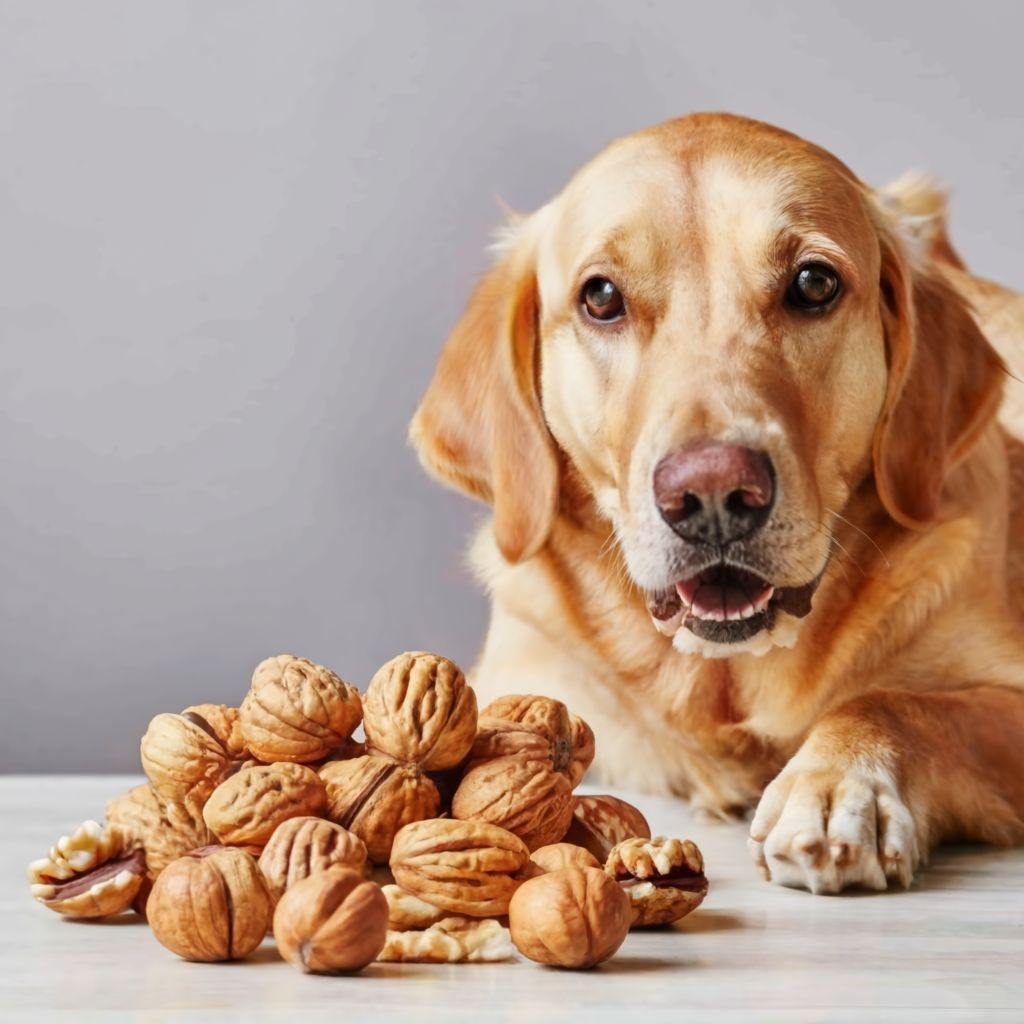Can Dogs Eat Walnuts? Everything You Need to Know

Can Dogs Eat Walnuts?
Have you ever wondered if dogs can eat walnuts? Dogs, like people, often eat a variety of foods. But not all human foods are safe for our furry friends. When it comes to walnuts, it is important to consider whether they are suitable for dogs. We are investigating to ensure the well-being of our canine companions.
Are walnuts safe for dogs to eat?
Walnuts are not safe for dogs. Although they may seem like tasty treats, they can be harmful to our canine friends. Walnuts contain a substance called juglone, which can be toxic to dogs and cause symptoms like digestive issues, pancreatitis, or seizures. Additionally, the hard shell of the walnut can cause choking and high fat levels in dogs, leading to digestive issues and pancreatitis. It is better not to give your dog walnuts and stick to safer treats made specifically for them. If you suspect your dog has eaten walnuts or is unwell, get in touch with your veterinarian immediately to seek advice and treatment.
Can dogs have raw walnuts?
No, it is not safe for dogs to eat raw walnuts. Raw walnuts, like other types of walnuts also contain nutmeg, which can be toxic to dogs if consumed. In addition, the hard shell of a walnut is a choking hazard and can cause intestinal obstruction if swallowed. Despite their natural and healthy attributes, raw walnuts can pose a risk of gastrointestinal upset, pancreatitis, or other serious health issues for dogs. It is best to avoid giving your dog raw walnuts and choose safer treats made specifically for dogs. If you suspect that your dog has eaten raw walnuts or is showing signs of illness, it is important to contact your veterinarian for guidance and assistance.
Can dogs have walnut shells or husks?
No, dogs cannot have nut shells or shells. Nutshells and shells can pose a serious hazard to dogs if ingested. They are both hard and indigestible, which can lead to choking or intestinal blockage. Additionally, walnut shells may also contain traces of the nut’s toxins, such as walnuts, which can be harmful to dogs. That’s why it’s important to keep walnut shells and shells out of your dog’s reach and make sure they’re not included in treats or toys. If you suspect that your dog has ingested walnut shells or bark, contact your veterinarian immediately for advice and follow-up.
Are there any health benefits of feeding walnuts to dogs?
Walnuts may provide beneficial nutrients to humans, such as healthy fats and antioxidants, but they do not offer significant health benefits for dogs. Feeding walnuts to dogs can be risky because of their high-fat content and a toxin called walnuts, which can be harmful to dogs.
Although walnuts contain omega-3 fatty acids, which are good for the heart. From a health perspective, dogs can get these nutrients from safer sources, such as fish oil or specially formulated dog foods. In addition, the risks of eating walnuts such as gastrointestinal upset and pancreatitis while feeding them or being choked by the hard shell are not at the same level as the benefits they provide.
That is why it is best to avoid feeding walnuts to dogs and choose a safer one. , a dog-friendly alternative. treats and snacks designed specifically for their nutritional needs. It is recommended that you seek advice from your veterinarian on how to improve your dog’s diet, as there are specific guidelines for each type that apply.
Can walnuts cause allergies in dogs?

Yes, walnuts can cause allergies in dogs, although this is relatively rare compared to other food allergies. Some people, including dogs (such as walnuts), are allergic to some foods, and also dogs can be sensitive to nuts. Symptoms of a nut allergy in dogs can include itching, skin irritation, redness, swelling, vomiting, diarrhea, or even more serious reactions such as difficulty breathing or anaphylaxis.
If you suspect that your dog may have a nut allergy, that is. important to avoid feeding them walnuts and to check their reactions to other foods containing nuts or similar allergens. It is important to seek advice from a veterinarian before administering medication for dietary restrictions in dogs. They may recommend allergy testing or an elimination diet to identify a specific allergen and create a treatment plan that is right for your furry friend.
Can dogs eat walnut butter or walnut oil?
Nut butters and nut oils are generally not recommended for dogs. Although these products may seem harmless, they may pose a health risk to your canine companion. Walnut butter and nut oil contain the same toxins found in whole walnuts, such as walnuts, that can be harmful to dogs and cause indigestion or other adverse effects.
Also, walnut butter and nut oil are high in fat, which can cause. digestive problems, pancreatitis, or obesity in dogs when consumed in large quantities. Avoid giving your dog walnuts or products that contain any of them, as it may cause harm if you choose to feed them with nuts.
Can dogs eat cooked or roasted walnuts?

It is not recommended to feed dogs cooked and roasted walnuts. Although cooking or roasting walnuts can change their texture and taste, this does not change the fact that they contain toxins that are harmful to dogs. Although cooking may help to lower the amount of toxins, it is still insufficient for making them safe for dogs. However, eating cooked or roasted walnuts can cause gastrointestinal upset, pancreatitis, or other side effects in dogs. Therefore, it is best to avoid giving your dog walnuts and choose safer treats made specifically for them. Always put your dog’s health and well-being first by providing food that is known to be safe for consumption.
What should I do if my dog eats walnuts?
If your dog eats walnuts, it is important to act immediately to minimize any potential health risks. Do this:
- If your dog has more than one walnut, remove them from their diet to prevent them.
- Discover the Growth of Your Dog: See. your dog closely for signs of anxiety or unusual behavior. The consumption of walnuts can lead to symptoms such as vomiting, diarrhea, abdominal pain, lethargy, and weakness, as well as seizures, tremors, or difficulty breathing.
- In case your dog has eaten walnuts or displays other symptoms, get in touch with your veterinarian immediately. Do not leave this information behind. They can provide guidance based on your dog’s specific situation and advise you on the best course of action. Be prepared to provide information such as the number of walnuts consumed, the time of consumption, and any symptoms observed.
- Depending on the severity of the problem, your vet may suggest taking your dog for testing or providing instructions for home care. of the condition. of the condition. Follow their advice exactly and follow their care recommendations.
- Take steps to prevent your dog from having access to walnuts or other potentially harmful foods in the future. Keep nuts and other toxic substances out of the dog’s reach and monitor the environment for potential hazards.
Before introducing any new food to your dog’s diet, it’s a good idea to consult with your veterinarian. Your dog’s health, size, weight, and dietary requirements can be taken into account when seeking advice from them. Additionally, it’s important to be aware of potential choking hazards — unpopped kernels,
